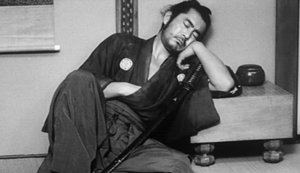DAYS OF HEAVEN and YOJIMBO/SANJURO details after the break.
BIGGER THAN LIFE – Though ignored at the time of its release, Nicholas Ray’s Bigger Than Life is now recognized as one of the great American films of the 1950s. When a friendly, successful suburban teacher and father (James Mason, in one of his most indelible roles) is prescribed cortisone for a painful, possibly fatal affliction, he grows dangerously addicted to the experimental drug, resulting in his transformation into a psychotic and ultimately violent household despot. This Eisenhower-era throat-grabber, shot in expressive CinemaScope, is an excoriating take on the nuclear family; that it came in the day of Father Knows Best makes it all the more shocking—and wildly entertaining. Available March 23, 2010.
SPECIAL EDITION FEATURES:
• New, restored high-definition digital transfer, with uncompressed monaural soundtrack on the Blu-ray edition
• Audio commentary featuring critic Geoff Andrew (The Films of Nicholas Ray)
• Profile of Nicholas Ray (1977), a half-hour television interview with the director
• New video appreciation of Bigger Than Life with author Jonathan Lethem (Chronic City)
• New video interview with Susan Ray, the director’s widow and editor of the book I Was Interrupted: Nicholas Ray on Making Movies
• Theatrical trailer
• PLUS: An essay by film writer B. Kite
DAYS OF HEAVEN and YOJIMBO/SANJURO details after the break.

DAYS OF HEAVEN – One-of-a-kind filmmaker-philosopher Terrence Malick has made some of the most visually arresting movies in history, and his glorious period tragedy Days of Heaven, featuring Oscar-winning cinematography by Nestor Almendros, stands out among them. A Chicago steelworker (Richard Gere) accidentally kills his supervisor, and he, his girlfriend (Brooke Adams), and his little sister (Linda Mans) flee to the Texas Panhandle, where they find work harvesting in the wheat fields of a wealthy farmer (Sam Shepard). A love triangle, a swarm of locusts, a hellish fire—Malick captures it all with dreamlike authenticity, creating at once a timeless American idyll and a gritty evocation of turn-of-the-century labor. Available March 23, 2010.
DIRECTOR-APPROVED BLU-RAY SPECIAL EDITION FEATURES:
• Restored high-definition digital transfer, supervised and approved by director Terrence Malick, editor Billy Weber, and camera operator John Bailey, with DTS-HD Master Audio soundtrack
• Audio commentary featuring Weber, art director Jack Fisk, costume designer Patricia Norris, and casting director Dianne Crittenden
• Audio interview with Richard Gere
• Video interviews with Bailey, cinematographer Haskell Wexler, and actor Sam Shepard
• PLUS: A booklet featuring an essay by critic Adrian Martin and a chapter from director of photography Nestor Almendros’s autobiography
YOJIMBO/SANJURO: TWO FILMS BY AKIRA KUROSAWA (SET & INDIVIDUAL) – Thanks to perhaps the most indelible character in Akira Kurosawa’s oeuvre, Yojimbo surpassed even Seven Samurai in popularity when it was released. The masterless samurai Sanjuro, who slyly manipulates two warring clans to his advantage in a small, dusty village, was so entertainingly embodied by the brilliant Toshiro Mifune that it was only a matter of time before he returned in a sequel. Made just one year later, Sanjuro matches Yojimbo’s storytelling dexterity yet adds a layer of world-weary pragmatism that brings the two films to a thrilling and unforgettable conclusion. Criterion is proud to present this pair of Kurosawa masterworks in new Blu-ray editions. Available March 23, 2010.
BLU-RAY SPECIAL EDITION FEATURES:
• Restored high-definition digital transfers with uncompressed monaural soundtracks
• Optional DTS-HD Master Audio Perspecta 3.0 soundtracks, preserving the original simulated stereo effects
• Audio commentaries by film historian and Kurosawa scholar Stephen Prince
• Documentaries on the making of Yojimbo and Sanjuro, created as part of the Toho Masterworks series Akira Kurosawa: It Is Wonderful to Create
• Theatrical trailer and teasers
• Stills galleries
• PLUS: Booklets featuring essays by film writers Alexander Sesonske and Michael Sragow, and notes from Kurosawa and his cast and crew